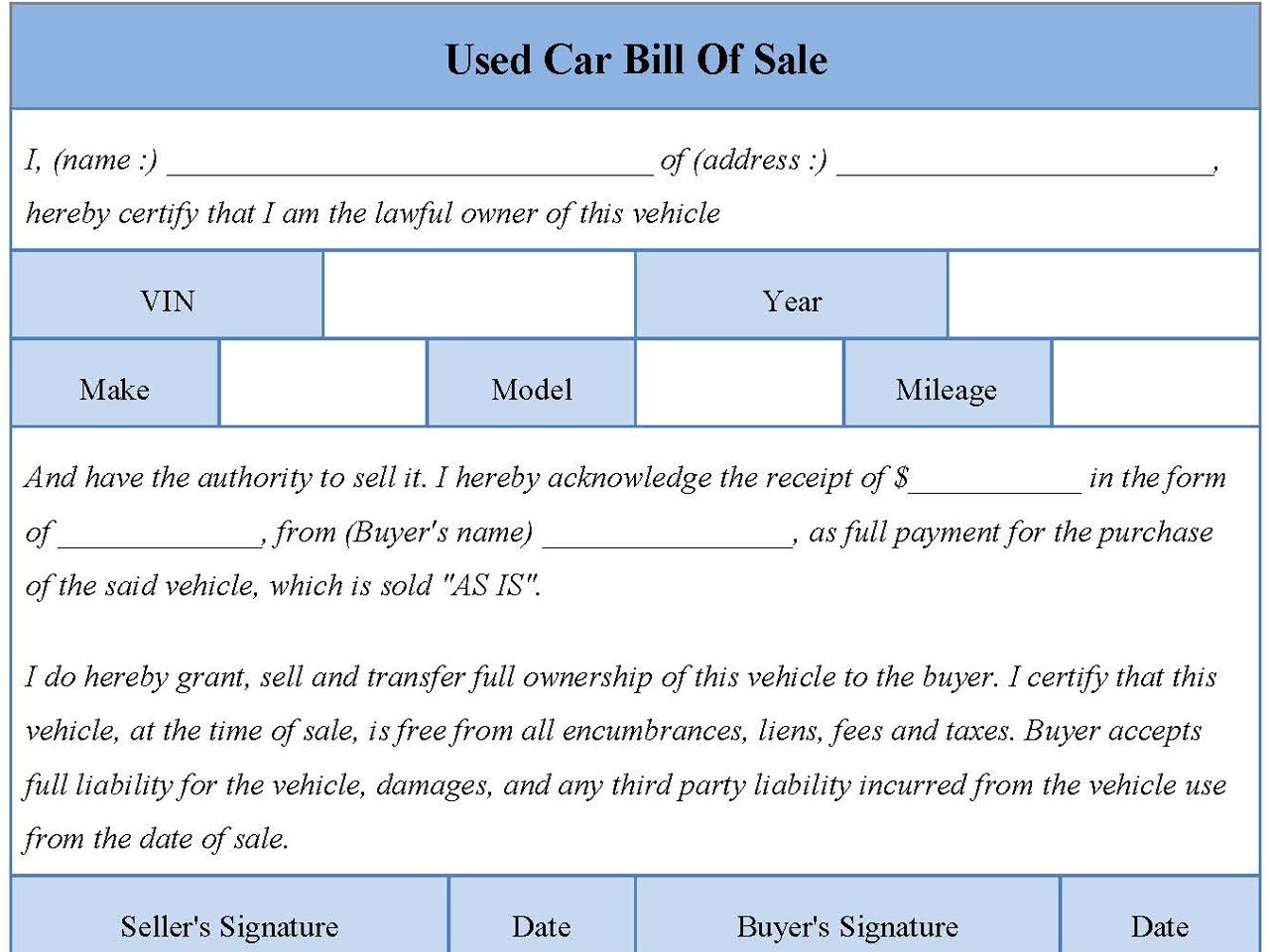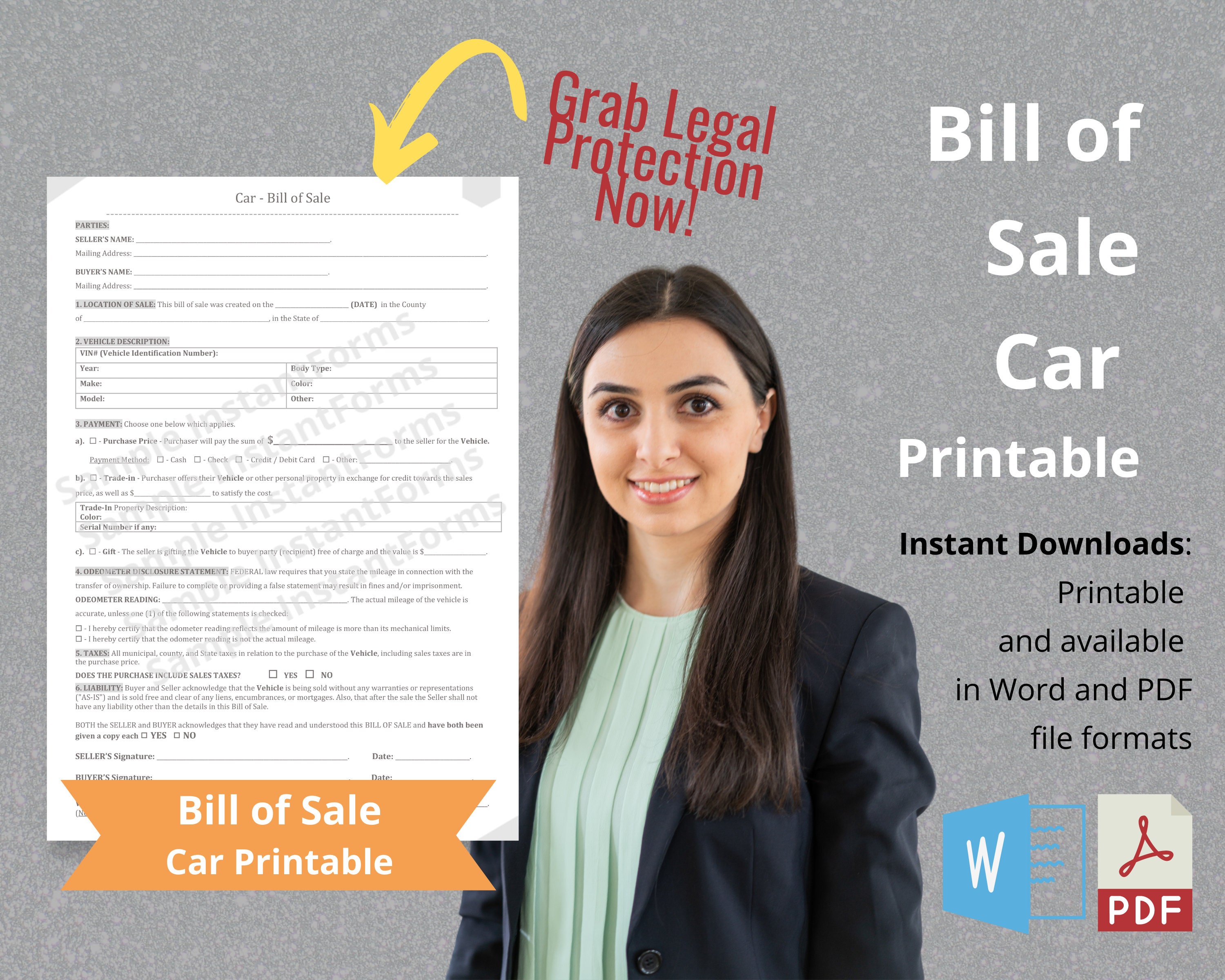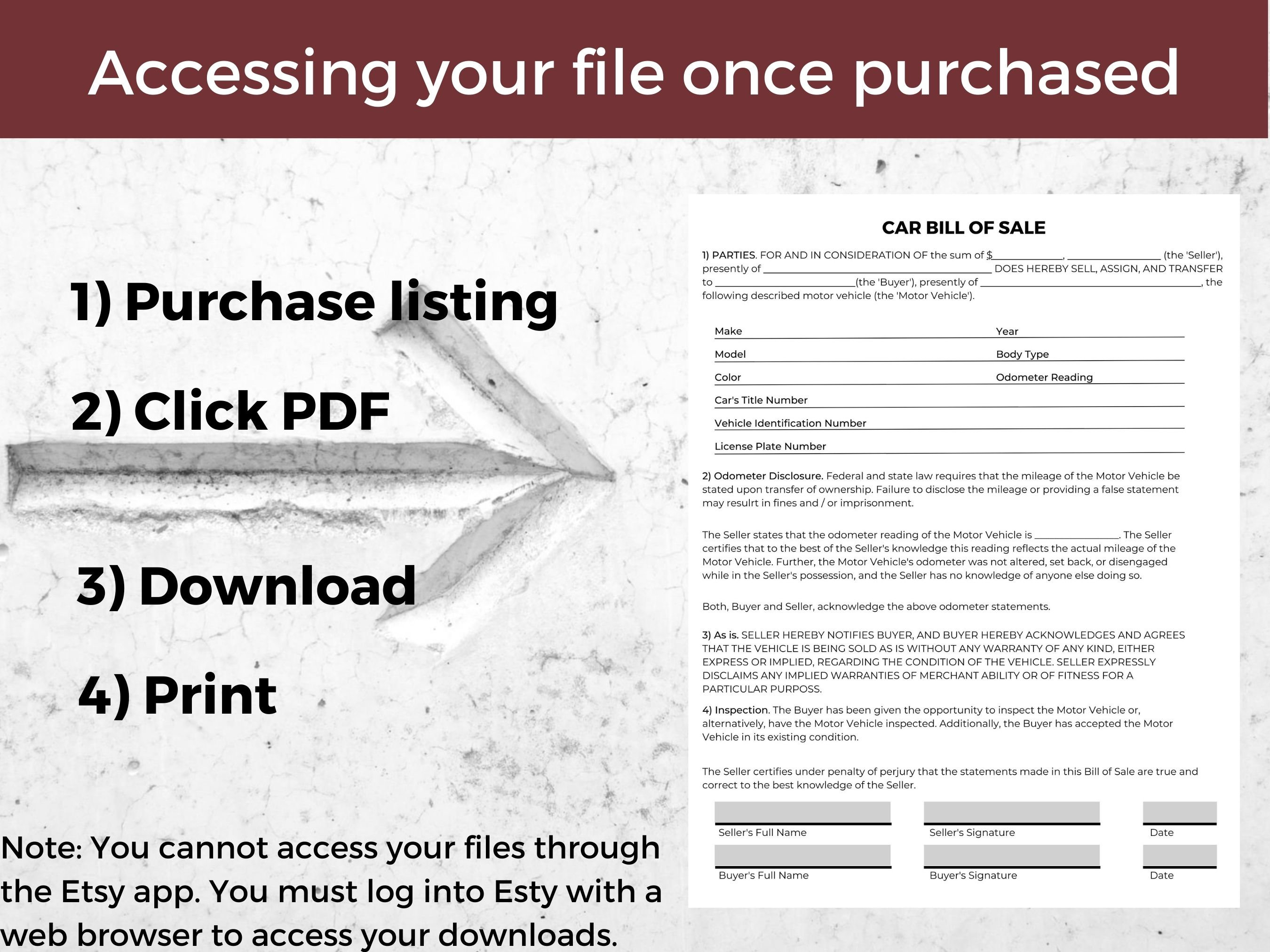
Legal Implications
A used car bill of sale is a crucial legal document that Artikels the terms and conditions of a vehicle’s sale. Understanding the legal responsibilities of both buyers and sellers, as well as the implications of incomplete or inaccurate information, is essential for a smooth and legally sound transaction. This section delves into the legal implications associated with used car bills of sale, emphasizing the importance of accuracy and completeness in these documents.
The bill of sale acts as a contract between the buyer and seller, solidifying the agreed-upon terms and conditions. It establishes the fundamental legal parameters of the transaction, including the price, date, and description of the vehicle. The document’s legal strength lies in its ability to provide verifiable evidence of the sale and transfer of ownership. Failing to adhere to the required legal standards in the bill of sale can lead to significant legal challenges.
Buyer Responsibilities
Understanding the buyer’s responsibilities in a used car transaction is critical. Buyers are expected to verify the accuracy of the information provided in the bill of sale. This includes scrutinizing the vehicle’s description, mileage, and any pre-existing issues. Thorough inspection before signing the bill of sale is a crucial step to mitigate potential legal disputes. Buyers should also be aware of their state’s specific legal requirements regarding the disclosure of vehicle defects.
Seller Responsibilities
Sellers are equally obligated to provide accurate and complete information on the bill of sale. This includes disclosing any known defects or issues with the vehicle. Failure to disclose such critical information can lead to legal repercussions. A seller’s duty extends to providing a fair and transparent transaction.
Role of Bill of Sale in Establishing Ownership
The bill of sale plays a pivotal role in establishing ownership of the vehicle. A properly executed and legally compliant bill of sale is a critical component of the ownership transfer process. It serves as proof of the transaction and helps to ensure the buyer’s title to the vehicle is secure. This document also serves as a critical record for legal proceedings in cases of disputes.
Implications of Incomplete or Inaccurate Information
Incomplete or inaccurate information on a used car bill of sale can have serious legal consequences. Such inaccuracies can lead to disputes over the terms of the sale, the condition of the vehicle, or even the ownership itself. A court may invalidate the bill of sale if substantial inaccuracies or omissions are identified.
Examples of Challengeable Bills of Sale
Several scenarios can lead to a used car bill of sale being challenged in court. For instance, a bill of sale that omits significant mechanical issues or misrepresents the vehicle’s mileage can be challenged by the buyer. Similarly, a bill of sale lacking essential signatures or proper identification of parties can be deemed invalid. The presence of fraudulent information, such as forged signatures, also renders the bill of sale void. These examples highlight the importance of accuracy and completeness in the bill of sale.
Legal Requirements in Different Jurisdictions
Legal requirements for used car bills of sale vary across different jurisdictions. Some states may require specific disclosures regarding the vehicle’s history, maintenance records, or title issues. The format and content of the bill of sale may also differ depending on the state or region. Buyers and sellers should consult their local laws and regulations to ensure compliance.
Protecting Yourself

Safeguarding yourself from potential pitfalls in used car transactions is paramount. A legally sound bill of sale, coupled with diligent pre-purchase verification, significantly reduces the risk of disputes and fraud. This section Artikels critical steps to ensure a smooth and secure used car purchase.
Creating a Legally Sound Bill of Sale
A comprehensive bill of sale is crucial. It should include the full legal names and addresses of both buyer and seller, the vehicle’s year, make, model, VIN, mileage, purchase price, and any additional fees. Crucially, the document should specify the method of payment, including cash, check, or financing details. It’s vital to include a clause that clearly states the condition of the vehicle as per the seller’s representation. Signatures from both parties, along with dates, are indispensable for legal validity. Consider including a clause outlining the buyer’s right to return the vehicle under specific circumstances, such as undisclosed major mechanical issues.
Protecting Yourself from Fraud or Disputes
Scrutinizing the seller and the vehicle is essential to avoid potential fraud or disputes. Verify the seller’s identity through official documentation, like a driver’s license or state-issued identification. Be wary of sellers who insist on unusual payment methods or pressure you into a quick decision. Be wary of excessively low prices compared to market value. Review the vehicle’s condition thoroughly before signing any documents. This proactive approach reduces the likelihood of future disputes.
Verifying Vehicle History Before Signing
Before committing to a purchase, meticulously verify the vehicle’s history. Utilize online resources like the National Insurance Crime Bureau (NICB) and state Department of Motor Vehicles (DMV) websites. These resources can reveal a history of accidents, liens, or outstanding loans against the vehicle. This verification process can prevent a costly mistake. For example, a vehicle with a history of significant damage might have hidden mechanical issues. This thorough check ensures a transparent transaction.
Importance of Independent Vehicle Inspections
An independent inspection by a qualified mechanic is highly recommended before finalizing the purchase. This inspection can identify potential mechanical problems or hidden damage. A professional mechanic can provide a comprehensive report detailing the vehicle’s condition. This is a proactive step to protect against hidden issues that could lead to costly repairs later. Examples of these hidden issues include engine problems, transmission failures, or faulty electrical systems.
Essential Questions to Ask a Seller
Thorough pre-purchase questioning can expose potential issues. A structured approach helps gather crucial information about the vehicle. This table provides a framework for your inquiries:
| Question Category | Specific Questions |
|---|---|
| Vehicle History | Has the vehicle been involved in any accidents? Has it been repaired recently? Are there any outstanding loans or liens? |
| Mechanical Condition | Has the vehicle been maintained regularly? Are there any recent mechanical repairs? Does the seller have maintenance records? |
| Ownership Details | Can you provide proof of ownership? Is there any outstanding registration or title issues? Have there been any changes in ownership? |
| Current Condition | Are there any visible signs of damage or wear and tear? How has the vehicle been stored or maintained? What is the vehicle’s current mileage? |
Common Issues

Used car bills of sale, while crucial for transferring ownership, can be fraught with potential pitfalls. Understanding these common issues is vital for both buyers and sellers to protect their interests and avoid costly mistakes. Careful review and attention to detail are paramount when navigating the complexities of used car transactions.
Thorough preparation and a clear understanding of the terms and conditions are essential to mitigating risks. This section will delve into potential problems, the role of warranties, situations where a bill of sale might not suffice, and examples of necessary supplementary documents. Understanding these nuances will equip you with the knowledge to ensure a smooth and legally sound transaction.
Potential Problems with Bills of Sale
Used car bills of sale can encounter various problems if not prepared and executed correctly. These range from simple omissions to more serious issues like inaccuracies or incomplete information. Missing details can lead to complications during the transfer of ownership, potentially causing delays or disputes.
Role of Warranties in Used Car Transactions
Warranties play a significant role in used car transactions, often impacting the value and risk assessment of the vehicle. A warranty, when present, guarantees certain aspects of the car’s performance or components for a specific duration. These warranties can be part of the bill of sale or separate agreements. It is crucial to understand the terms and limitations of any warranty to fully assess the risks involved. Inclusion of a warranty, if applicable, is a vital component of a comprehensive bill of sale.
Situations Where a Bill of Sale Might Not Be Sufficient
In some circumstances, a used car bill of sale alone might not be enough to transfer ownership. This occurs when additional documentation is required to complete the transfer process. For instance, if the vehicle is subject to a lien or financing agreement, the lender’s consent and release of the lien must be obtained. A clear title and registration are also often required.
Situations Requiring Additional Documents
A used car bill of sale often needs to be accompanied by other documents for a legally sound transfer. These include the title, registration, and proof of insurance. The title document is critical for verifying ownership and compliance with local laws. Registration details ensure the vehicle is compliant with local regulations. In some instances, proof of insurance may be required, especially if the sale involves an insured vehicle.
Common Mistakes in Bill of Sale Preparation
Understanding common mistakes in preparing a used car bill of sale is crucial for avoiding potential issues. Inaccurate details, missing signatures, or incomplete information can lead to disputes or complications.
| Mistake | Explanation | How to Avoid |
|---|---|---|
| Missing Signatures | Essential parties, such as the buyer and seller, may not have signed the bill of sale. | Ensure all required signatures are present and properly witnessed. |
| Inaccurate Vehicle Information | Incorrect details about the vehicle, such as the year, make, model, or VIN, can create problems. | Carefully verify all details against the vehicle’s documentation before finalizing the bill of sale. |
| Omission of Important Clauses | Crucial clauses related to warranties, responsibilities, or other relevant aspects might be missing. | Consult with legal professionals or use templates that cover all essential details. |
| Lack of Clear Description | The bill of sale might not clearly describe the vehicle’s condition. | Include a detailed description of the vehicle’s condition, including any known defects or issues. |
| Failure to Mention Existing Liens | Any outstanding liens or encumbrances on the vehicle are not explicitly noted. | Include a clause stating that the vehicle is free from any liens or encumbrances, or obtain appropriate releases if applicable. |
Alternative Formats

Beyond the standard used car bill of sale, various formats exist, each tailored to specific circumstances and legal jurisdictions. Understanding these alternatives is crucial for both buyers and sellers to ensure a smooth and legally sound transaction. Different countries and regions have specific requirements and preferences for how these documents should be structured.
Different Bill of Sale Formats
Various formats for used car bills of sale cater to specific needs. A simple format might suffice for a private sale, while a more comprehensive one is necessary for a dealer transaction. These formats can vary widely in terms of content and structure, with some focusing on basic details and others including extensive warranties or financing terms.
Examples of Different Bill of Sale Formats
- Private Party Sale: A straightforward bill of sale might simply include the names, addresses, and contact information of the buyer and seller, vehicle identification number (VIN), price, and signature. This format is common for private sales and often avoids complexities.
- Dealer Sale: A dealer bill of sale is typically more extensive, including details about warranties, financing options, and potential add-ons. It may also include specific clauses about return policies or dispute resolution.
- Online Marketplace Bill of Sale: Online platforms often have their own templates, which may include additional fields for online payment confirmation, escrow account details, or delivery instructions.
Examples of Bills of Sale in Different Countries/Regions
Different regions and countries have specific legal requirements for used car bill of sale formats. For example, some jurisdictions require specific disclosures about vehicle history, maintenance records, or safety inspections. Laws regarding vehicle registration and titling processes also influence the bill of sale structure.
Comparison of Advantages and Disadvantages
- Simple Format (Private Sale): Advantages include speed and simplicity. Disadvantages are limited protection for both parties. The lack of legal documentation may leave the buyer or seller vulnerable in disputes.
- Comprehensive Format (Dealer Sale): Advantages include greater legal protection, clear Artikels of terms and conditions, and greater transparency for both parties. Disadvantages may include complexity and potential for lengthy legal reviews.
- Online Platform Formats: Advantages include streamlined transactions and secure payment processing. Disadvantages include dependence on the platform’s policies and potential issues if the platform isn’t reputable.
Modifying a Standard Bill of Sale Template
Adapting a standard bill of sale template to fit specific circumstances requires careful consideration of the specific transaction. For example, if a buyer wants a specific warranty, it should be explicitly stated in the bill of sale. Likewise, any special conditions, such as financing arrangements or delivery details, should be included clearly and unambiguously.
Table of Used Car Sales and Bill of Sale Requirements
| Type of Used Car Sale | Bill of Sale Requirements |
|---|---|
| Private Party Sale | Basic information, signatures, price, VIN |
| Dealer Sale | Detailed information, warranties, financing, return policies |
| Auction Sale | Auction house’s specific requirements, payment procedures |
| Online Marketplace Sale | Platform’s specific requirements, payment processing |